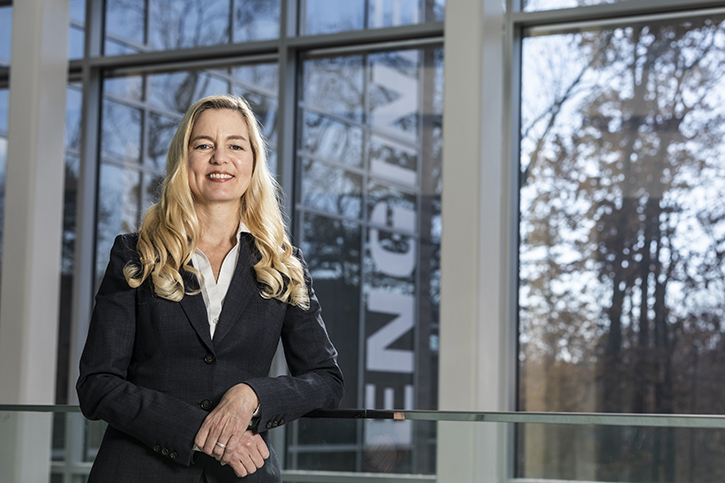
Liza Wilson Durant, Associate Dean for Strategic Initiatives and Community Engagement at the Volgenau School of Engineering. Photo by Lathan Goumas/Strategic Communications
Liza Wilson Durant knows a thing or two about George Mason University’s effort to expand computing and STEM (science, technology, engineering and mathematics) programs. For the past several years, the associate dean of strategic initiatives and community engagement at the Volegenau School of Engineering has helped prepare students for high-demand jobs in Northern Virginia’s bustling technology industry.
So it made sense that she was at the center of Mason’s pitch to help bring Amazon to Crystal City, Virginia.
During a panel discussion on National Public Radio’s “The Kojo Nnamdi Show,” Durant spoke at length about how Mason is well positioned to serve Amazon and has been preparing for this moment for a decade. The show aired this past Tuesday in the Washington, D.C., area.
“My first response was ‘Perfect timing!’” Durant said of Amazon’s decision to locate its newest headquarters in Northern Virginia. “George Mason University has been working for, say, the last decade and maybe the last six years in earnest to really deliver on the tremendous tech demand of the flourishing tech economy of Northern Virginia. We’re 8,000-strong in our engineering school, 5,000 in computer science. So, for us, it was the right time, the right place.”
Mason has pledged more than $250 million over the next five years to expand programs and hire large numbers of new faculty at its Arlington Campus to boost undergraduate and graduate enrollment numbers in STEM-related fields by 2024.
Other highlights from her conversation follow. Listen to the full conversation here:
On how the ready availability of so many well-trained students in Northern Virginia influenced Amazon’s decision: “We’ve been attracting students—particularly to computing and engineering—because of the tremendous partnerships we’ve had with industry in Northern Virginia. I like to believe that we have incredibly well-trained students that are really prepared to meet the demands specifically dictated and designed by the companies that hire them. I think we’re ready.”
On incorporating technical skills with the kind of critical thinking skills students gain in the humanities in fields like communication, government and history with the establishment of a digital credential program: “The skills that those students have are of tremendous value to tech companies, and the tech companies would also like to see them all have a little bit of exposure to some of the tech fields so that they are well versed in the language [that] the engineers and the computer scientists will be speaking. We see that there’s room for the technology and the learning to go in both directions.”
On bringing everything together to get ready for Amazon’s arrival: “We’re very careful to plan ahead, to provide not only the facilities for the growth, but also world-class faculty. That student-faculty ratio is so important. And also, finally, ensure that our community is ready to support the well-being of our students. That’s a very high priority for George Mason. To invest in well-being and student experience and culture, including the arts, is very important as well. So we’re bringing it all together by sticking to our strategic plan and following through on the work we began many decades ago. We’re excited.”
